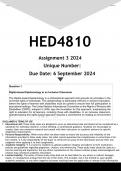HED4810
Assignment 3 2024
Unique Number:
Due Date: 6 September 2024
Question 1
Rights-based Epistemology in an Inclusive Classroom
The Rights-based Epistemology is a philosophical approach that grounds its principles in the
universal rights of individuals. This epistemology is particularly relevant in inclusive education,
where the rights of learners with disabilities must be upheld to ensure their full participation in
educational settings. The United Nations International Convention on the Rights of Persons with
Disabilities (CRPD), adopted in 2006, lays the foundation for this approach, emphasizing the
right to education for all learners, including those with disabilities. In an inclusive classroom,
operationalizing this rights-based approach requires a commitment to creating an environment
that respects, protects, and fulfills these rights
DISCLAIMER & TERMS OF USE
1. Educational Aid: These study notes are designed to serve as educational aids and should not be considered as a
substitute for individual research, critical thinking, or professional guidance. Students are encouraged to
conduct their own extensive research and consult with their instructors or academic advisors for specific
assignment requirements.
2. Personal Responsibility: While every effort has been made to ensure the accuracy and reliability of the
information provided in these study notes, the seller cannot guarantee the completeness or correctness of all
the content. It is the responsibility of the buyer to verify the accuracy of the information and use their own
judgment when applying it to their assignments.
3. Academic Integrity: It is crucial for students to uphold academic integrity and adhere to their institution's
policies and guidelines regarding plagiarism, citation, and referencing. These study notes should be used as a
tool for learning and inspiration, but any direct reproduction of the content without proper acknowledgment and
citation may constitute academic misconduct.
4. Limited Liability: The seller of these study notes shall not be held liable for any direct or indirect damages,
losses, or consequences arising from the use of the notes. This includes, but is not limited to, poor grades,
academic penalties, or any other negative outcomes resulting from the application or misuse of the information
prov
]
, For additional support +27 81 278 3372
Question 1
Rights-based Epistemology in an Inclusive Classroom
The Rights-based Epistemology is a philosophical approach that grounds its principles in
the universal rights of individuals. This epistemology is particularly relevant in inclusive
education, where the rights of learners with disabilities must be upheld to ensure their full
participation in educational settings. The United Nations International Convention on the
Rights of Persons with Disabilities (CRPD), adopted in 2006, lays the foundation for this
approach, emphasizing the right to education for all learners, including those with
disabilities. In an inclusive classroom, operationalizing this rights-based approach requires
a commitment to creating an environment that respects, protects, and fulfills these rights.
Human Rights Principles in the CRPD
The CRPD outlines several human rights principles that are critical to inclusive education.
Among these principles are:
1. Non-discrimination: This principle emphasizes that all individuals, regardless of
their abilities, should have equal access to education without any form of
discrimination. In an inclusive classroom, this principle is operationalized by ensuring
that all learners, including those with disabilities, have access to the same
educational opportunities. For example, a teacher might provide adapted learning
materials, such as Braille textbooks or audio recordings, for visually impaired learners
to ensure they can access the curriculum like their peers.
2. Full and effective participation and inclusion in society: The CRPD advocates
for the full inclusion of individuals with disabilities in all aspects of life, including
education. In practice, this means creating an inclusive classroom environment
where all learners feel valued and can participate actively. For instance, group
activities can be designed in such a way that every learner, regardless of their
abilities, can contribute meaningfully. A teacher might use differentiated instruction
strategies to ensure that tasks are tailored to the varying needs and strengths of the
learners.
3. Respect for inherent dignity, individual autonomy including the freedom to
make one's own choices, and independence of persons: This principle




